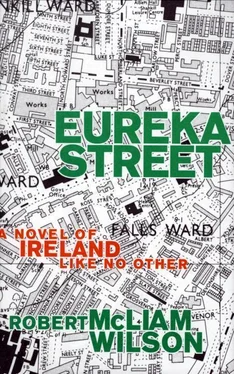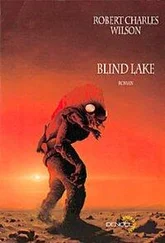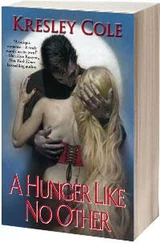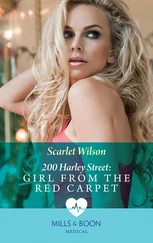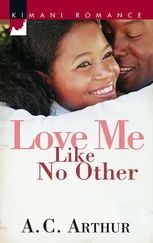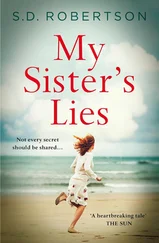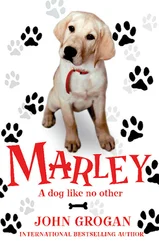A television special had been broadcast showing Ghinthoss, looking disturbingly like Santa Claus, receiving both awards. Picking up his knighthood, he had spoken of the cloudiness of nationality, the New Europe and the breaking up of borders. He had smiled twinklingly when someone asked him about the suddenly vacant poet laureate job. At the Hero of the Revolution Dinner and Disco, the very next day, he had told the rapturous crowd how he had always been an Irishman and how he would always be one. No one noticed any contradiction. A Shague Ghinthoss cookery book and a new collection of his Rejected Poems (1965–1995) was already in the pipeline. Chuckie damned himself for not having thought of that first.
As Chuckie watched television, something simmered in his non-stick mind. When he had been in America he had grown sentimental about his home town. America had seemed so vivid, so jumbled and chaotic. He had pondered affectionately on how Belfast had stayed gloriously the same throughout the thirties, forties, fifties and sixties. It had been unfortunately Protestant but thrillingly provincial. Political violence had somewhat disrupted the sleepy obscurity of the place but Chuckie felt that there was something in the heart of his birthplace that was profoundly everyday.
And now, as he watched television beside his wife-to-be (and son-to-be), Chuckie listened to a variety of people tell him that the Troubles were at an end. Peace had come at last. The war was over.
Then Chuckie lit on what he had been clumsily attempting to think:
What war? No one he knew had been fighting.
Initially, it seemed ludicrous to him. It was such an obvious thought. It was too simple to have any real significance. But, as the belly-rubbing minutes passed, the enormity of this notion impacted upon him. He babbled confusedly to Max about what was on his mind. She ignored him mostly. (Max had always believed Northern Irish violence to be distinctly overrated. The Irish were a bit precious about their trauma. They should have tried Manhattan on any Saturday night.)
That day, Chuckie had gone back into the office for the first time in a fortnight. Luke Findlater was glad, if disturbed, to see him. They had made a lot of money in those two weeks, and ever since Chuckie's American success, Northern Irish television companies had been looking for him desperately. His debate with Jimmy Eve had not gone unnoticed. Several cisatlantic broadcasters were queuing up to stage a local rematch.
Chuckie had ignored these blandishments and had told Luke that he was not interested. But, as he listened to Max's television telling him things he didn't believe, Chuckie changed his mind. He called Luke and told him to say yes to all the interviews he had declined. Luke was grumpy and mystified but, as always, Chuckie prevailed.
`Hey, Chuck,' said Max, `what are you up to?'
Chuckie kissed his way down her stomach.
`Mnrth thaghth orfthf njr thruhhth,' he replied.
Chuckie spent most of the next day borrowing money. With all his new skills and massive reputation, he found this an easier task even than hitherto. John Evans alone promised him fifteen million dollars. He ended the day with pledges of more than twenty-five million pounds from various people and organizations. Chuckie was happy.
He and Luke grabbed a pizza and dined in the office, talking tactics. Well, Chuckie dined and talked. Luke was so bewildered by the fund-raising he had witnessed that day that he was barely capable of speech and unable to eat solid food. Chuckie explained that he intended to use his television appearance that very night to launch a new industrial initiative. Jimmy Eve was scheduled to appear with him, but after his last experience Chuckie was confident of settling his revolutionary hash within the first few minutes. He could then devote the rest of the programme to announcing his new project. Massive reinvestment in the city of his birth, nothing less than the industrial rebuilding of Belfast. He told Luke that the riot had proved to him that Belfast people had amounts of energy they didn't know what to do with. Chuckie knew what to do with their energy.
It had struck Chuckie that the political conflict that had occurred during his entire adult life had been a lie. It was a war between an army that said it didn't want to fight and a group of revolutionaries who claimed that they didn't want to fight either. It had nothing to do with imperialism, self-determination or revolutionary socialism. And these armies didn't often kill each other. Usually they just killed whoever of the citizenry happened to be handy.
Chuckie was too stupid to think he understood a great deal of anything but he deeply understood the majority politics of Northern Ireland. The majority politics in Northern Ireland were not political. The citizens were too shy to give the grand name of principle to any of the things that they believed, but there were still things that they believed. And that peaceful majority spent its life keeping down jobs or failing to keep down jobs, buying washing-machines and houses and vacuumcleaners and holidays and carry-cots. The way they were doing these things had changed the face of the city in the last ten years. Protestant areas were Protestant no longer. Working-class areas had become bourgeois. The city was moving outwards like a spreading stain. That was what cities did and that was what Chuckie, correctly or incorrectly, understood as politics.
He was confident that his pragmatic announcement of massive job-creation projects would silence Jimmy Eve's feeble ideological spoutings. Ideology was a thick enough blanket but it wasn't as warm or sustaining as employment. Eve could arrange for the odd bomb here and there but he, Chuckie Lurgan, would bring back work to the city single-handed. He would be a hero.
He called his mother before he went to the television studio. She asked him what he would wear. His blue suit and his new Doc Martens, he told her. She told him that the outfit would look nice. Chuckie was faintly disturbed. Only a month before, she would have disapproved strongly of the DMs. Chuckie wondered if sexual deviance liberated everyone's sartorial tastes.
`I met a woman in the supermarket who wanted your autograph,' said Peggy. `She's the first woman from Sandy Row who's spoken to me in a fortnight. You're very famous, son.'
The faint Lurganish awe in his mother's voice pleased him.
`Caroline sends her love and says good luck,' Peggy continued.
Chuckie swallowed nervously. `Ah, thank her for me.'
'OK.'
`I have to go now,' he said. `I don't want to be late.'
`Hey, Chuckie,' said his mother.
`What?'
`You love me,' said Peggy, confidently.
`Sure thing,' said Chuckie.'No problem.'
The interview had been going for about fifteen minutes before Chuckie sensed that it wasn't going the way he had intended. When he arrived at the studio, he had been bundled into a separate waiting room, obviously at the request of Jimmy Eve and the Just Us crew. He was to be the third guest and, as he watched the show on the monitor in his dressing room, Chuckie was delighted to see that there was a small group of Americans in the audience wearing MFG (Mad Fat Guy) Tshirts. They had flown all the way from the States on the offchance of meeting him.
The first guest was an academic who had been wheeled on to give his views on the current ceasefire and to explain his theory that the mysterious underground OTG movement was the missing dynamic in Irish politics. It was this man's profound belief that OTG were the initials of the Omagh Trotskyist Group.
Eve was the second guest. Chuckie was pleased to see that he was nervous and trembling unmistakably.
Jimmy Eve had been trembling constantly for nearly three weeks now. Ever since his televised meeting with Chuckie Lurgan, it had all been going wrong for the Ardoyne ideologue. At Just Us meetings, his unease was evident and remarked upon. It was particularly bad, however, when he had to make public appearances. It made him angry and unappeasable. He had even seen his doctor about it. The situation had not been improved by his six-year-old daughter who, having asked him what a unitedireland was, had walked away only half-way through his explanation. The ostensible flush on his face was bad enough but it had brought a return of his old complaint, the inward tremble, the private shame.
Читать дальше
